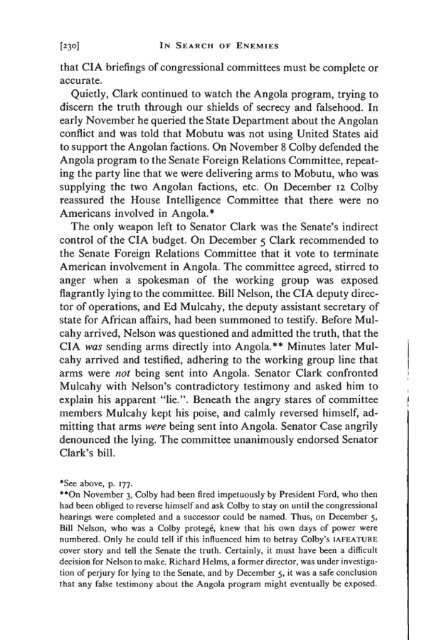In Search of Enemies - A CIA Story - John Stockwell
In Search of Enemies - A CIA Story - John Stockwell
In Search of Enemies - A CIA Story - John Stockwell
You also want an ePaper? Increase the reach of your titles
YUMPU automatically turns print PDFs into web optimized ePapers that Google loves.
[230] IN SEARCH OF ENEMIES<br />
that <strong>CIA</strong> briefings <strong>of</strong> congressional committees must be complete or<br />
accurate.<br />
Quietly, Clark continued to watch the Angola program, trying to<br />
discern the truth through our shields <strong>of</strong> secrecy and falsehood. <strong>In</strong><br />
early November he queried the State Department about the Angolan<br />
conflict and was told that Mobutu was not using United States aid<br />
to support the Angolan factions. On November 8 Colby defended the<br />
Angola program to the Senate Foreign Relations Committee, repeating<br />
the party line that we were delivering arms to Mobutu, who was<br />
supplying the two Angolan factions, etc. On December 12 Colby<br />
reassured the House <strong>In</strong>telligence Committee that there were no<br />
Americans involved in Angola.•<br />
The only weapon left to Senator Clark was the Senate's indirect<br />
control <strong>of</strong> the <strong>CIA</strong> budget. On December 5 Clark recommended to<br />
the Senate Foreign Relations Committee that it vote to terminate<br />
American involvement in Angola. The committee agreed, stirred to<br />
anger when a spokesman <strong>of</strong> the working group was exposed<br />
flagrantly lying to the committee. Bill Nelson, the <strong>CIA</strong> deputy director<br />
<strong>of</strong> operations, and Ed Mulcahy, the deputy assistant secretary <strong>of</strong><br />
state for African affairs, had been summoned to testify. Before Mulcahy<br />
arrived, Nelson was questioned and admitted the truth, that the<br />
<strong>CIA</strong> was sending arms directly into Angola.•• Minutes later Mulcahy<br />
arrived and testified, adhering to the working group line that<br />
arms were not being sent into Angola. Senator Clark confronted<br />
Mulcahy with Nelson's contradictory testimony and asked him to<br />
explain his apparent "lie.". Beneath the angry stares <strong>of</strong> committee ~<br />
members Mulcahy kept his poise, and calmly reversed himself, admitting<br />
that arms were being sent into Angola. Senator Case angrily<br />
denounced the lying. The committee unanimously endorsed Senator<br />
Clark's bill.<br />
•See above, p. 177.<br />
••on November 3, Colby had been fired impetuously by President Ford, who then<br />
had been obliged to reverse himself and ask Colby to stay on until the congressional<br />
hearings were completed and a successor could be named. Thus, on December 5,<br />
Bill Nelson, who was a Colby protege, knew that his own days <strong>of</strong> power were<br />
numbered. Only he could tell if this influenced him to betray Colby's IAFEATURE<br />
cover story and tell the Senate the truth. Certainly, it must have been a difficult<br />
decision for Nelson to make. Richard Helms, a former director, was under investiga·<br />
tion <strong>of</strong> perjury for lying to the Senate, and by December 5, it was a safe conclusion<br />
that any false testimony about the Angola program might eventually be exposed.


